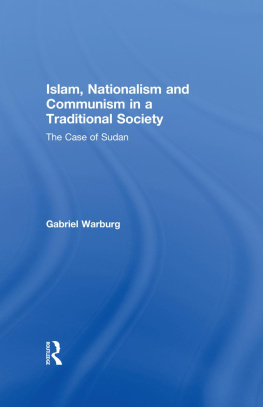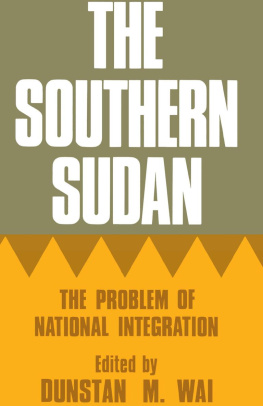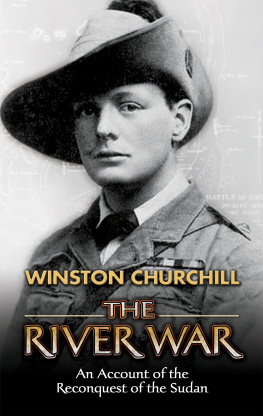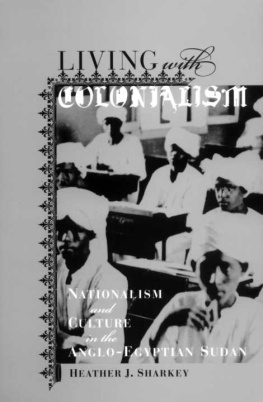Routledge Revivals
The Sudan under Wingate
First published in 1970 by Frank Cass and Company Limited
This edition first published in 2018 by Routledge
2 Park Square, Milton Park, Abingdon, Oxon, OX14 4RN
and by Routledge
52 Vanderbilt Avenue, New York, NY 10017, USA
Routledge is an imprint of the Taylor & Francis Group, an informa business
1970 by G. Warburg
All rights reserved. No part of this book may be reprinted or reproduced or utilised in any form or by any electronic, mechanical, or other means, now known or hereafter invented, including photocopying and recording, or in any information storage or retrieval system, without permission in writing from the publishers.
Publishers Note
The publisher has gone to great lengths to ensure the quality of this reprint but points out that some imperfections in the original copies may be apparent.
Disclaimer
The publisher has made every effort to trace copyright holders and welcomes correspondence from those they have been unable to contact.
A Library of Congress record exists under ISBN:
ISBN 13: 978-0-367-14874-4 (hbk)
ISBN 13: 978-0-367-14875-1 (pbk)
ISBN 13: 978-0-429-05371-9 (ebk)
The Sudan Under Wingate
S IR F. R EGINALD WI NGATE AND K ARL VON S LATIN P ASHA
The Sudan Under Wingate
Administration in the Anglo-Egyptian Sudan 18991916
Gabriel Warburg
Haifa University, Israel
First published in 1971 by FRANK CASS AND COMPANY LIMITED 67 Great Russell Street, London WC1B 3BT
1970 G. Warburg
ISBN 0 7146 2612 0
All Rights Reserved. No part of this publication may be reproduced in any form or by any means electronic, mechanical, photocopying, recording or otherwise, without the prior permission of Frank Cass and Company Limited in writing.
Printed in Great Britain by Clarke, Doble & Brendon, Ltd., Plymouth
T HE purpose of this book is to describe and to analyse the administrative policies in the Anglo-Egyptian Sudan during the formative years of the Condominium. The period chosen for this purpose corresponds with the governor-generalship of Sir Reginald Wingate, whose seventeen years as governor-general of the Sudan, had a lasting effect on later developments. This book is therefore primarily about Wingate, Slatin Pasha and a handful of British officials who formulated and executed the Sudans administrative policy. It also tries to assess the role played by the Egyptian government and its representatives in the Sudan, in shaping the government of a country, of which they were supposed to be co-rulers. Finally, the book attempts to estimate the effects of administration on the population of the Sudan and to find out whether certain groups within the population influenced the development of government policies as time went on.
I have tried to evaluate the impact of the British and Egyptian governments in formulating policies in the Sudan. However, I limited myself to administrative aspects without trying to assess the political implications of the reconquest. Certain spheres of administration have been dealt with quite briefly. The development of education in the Northern Sudan has been covered adequately by Mr. Mohammed Omar Beshir, while Dr. L. M. Sanderson has devoted her research to education in the South. In view of these works, and also the fascinating autobiography of Shaykh Bbikr Badri, the founder of girls education in the Sudan, I have decided to limit myself only to those aspects of education which had a direct bearing on other fields of administration. Similarly, the development of communications and transport has been described by Mr. R. L. Hill and Dr. O. M. O. Abdu, while the beginnings of a medical service were dealt with by Dr. H. C. Squires. Finally, the economic financial and agricultural policies during the early years of the Condominium, have been admirably dealt with by Mr. J. Stone, Dr. A. W. Abdel Rahim and Mr. A. Gaitskell.
The source materials used in writing this book are primarily the official and private papers of the Sudan government officials who worked in the Sudan until the end of the First World War. Most of these papers have been stored at the Sudan Archive in the School of Oriental Studies, University of Durham. Other collections are those of the Church Missionary Society in London, the Anti-Slavery Society at Oxford, private and official records at the Public Record Office, London, and the Sudan Intelligence Reports at the War Office Library, London. This brings me to a major shortcoming, namely the lack of adequate source material of Egyptian or Sudanese origin. Ample use has been made of the few existing autobiographies written by inhabitants of the Sudan. Nonetheless, in the absence of adequate sources, I tried to assess the reactions of the Sudanese to their new rulers through the reflection of their views in the private papers of the administrators. I can only hope that further evidence will emerge and enable historians to shed some light on this problem.
For the spelling of Arabic names and terms I have followed the accepted system of transliteration which will enable readers to find these terms in Arabic publications and dictionaries. The only exception is in regard to names of larger towns which are spelt in the conventional form, e.g. El Obeid, Khartoum, Suakin.
M Y thanks are due to many who assisted me in writing this book and in preparing the thesis, on which it is largely based. In the first place I acknowledge my gratitude to Professor P. M. Holt, who guided me throughout my research and made many suggestions with regard to the final form of this book. I owe many thanks to Professor G. Baer, whose initial encouragement prompted me to undertake this research, and who offered me invaluable advice. Professor G. N. Sanderson, Dr. H. Shaked and Dr. N. Rose read the manuscript and offered many recommendations regarding its structure and contents; numerous suggestions have been included in the book and improved its final form. However, none of the above hold any responsibility for any errors or shortcomings the book may still hold.
I express my gratitude to Mr. I. J. C. Foster, keeper of Oriental books at the University Library, Durham, who enabled me to pursue my research at the Sudan Archive. I am also grateful to the librarians of the War Office, the Public Record Office, the Church Missionary Society, and the keeper of the Anti-Slavery archive, for allowing me to use their valuable collections.
For valuable assistance I would like to express appreciation to the late Sir Harold A. MacMichael who placed his vast experience of the Sudan at my disposal. Also Lady C. Bonham Garter, who answered my inquisitive questions regarding the work of the late Sir Edgar Bonham Garter, first legal secretary of the Anglo-Egyptian Sudan.
Quotations taken from Crown Copyright records in the Public Record Office and other archives appear by permission of the Controller of H. M. Stationery Office. I would like to thank the editors of Asian and African Studies and Middle Eastern Studies for allowing me to include parts of two of my papers, which had previously been published in their journals, in the present volume.
My thanks are extended to the Central Research Fund of the University of London, the Friends of the Hebrew University of Jerusalem in London, and the Haifa University College, whose financial generosity enabled me to pursue my research in the most favourable conditions.







